Journey to U.S. Partner Diakonie: In the Footsteps of CHHSM
Text and photos: Sabine Damaschke, Diakonie RWL
The following article is reprinted from the website of Diakonie RWL (Rheinland, Westfalen, Lippe), CHHSM’s ministry partner in Germany. The text is translated via the Google translator.
For one week, Elke Grothe-Kühn (Hospital and Health Director), Martina Althoff (Nursing Care), Susanna Thiel (Refugee), Sabine Damaschke (Press Officer) and Matthias Dargel (Director of Christian Youth Village Germany), a large member Diakonie RWL, traveled in St. Louis and the region.
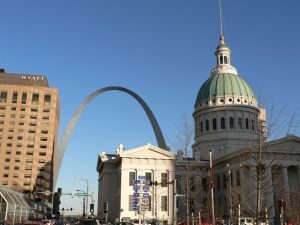
The Arch in St. Louis
A huge bow as a symbol of hope for a free and better life: This is how St. Louis presents itself with its famous Gateway Arch. But the history of the city, which is characterized by German immigrants, testifies to slavery and social problems. CHHSM, the US partner organization of Diakonie RWL, is responsible for many social projects. A delegation from our association visited St. Louis to see various facilities and attend the CHHSM Annual Meeting.
Poverty in old age
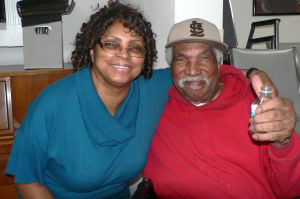
In a good mood because well looked after: Bob with nurse Mary Ishmen
For most of his life, Bob has entertained audiences as a comedian. But his fee was not enough for a good pension. He now lives in Jennings Affordable Housing in St. Louis, a retirement home run by CHHSM’s St. Andrew’s Resources for Senior Living Communities. “I am glad that this house is for low-income people and that Mary is looking for me here.” Mary Ishmen is the nurse who comes three days a week to check on the residents’ blood pressure, medication, vaccinations and counseling. This not only saves the long journey to a doctor, but also saves a lot of money.
Poor and underinsured
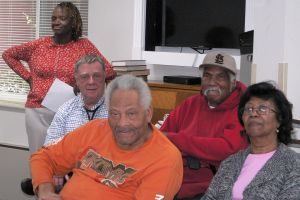
Astonished at the good health care in Germany: Residents of “Jennings Affordable Housing”
Nearly 50 million Americans are considered poor. Around 28 million have no health insurance. The number of people who have insurance but are considered underinsured is high. Bob is one of them. He is astonished that there is nationwide state health care in Germany. “Wow, that’s like in paradise, I should emigrate,” he says and laughingly points to his walker. The German health insurance and health care belonged to the topics, which interested the Americans in the discussion with the German Diakonie RWL delegation the most.
From one project to another
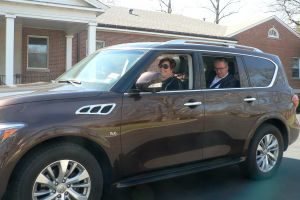
Out and about in the chic car: Danielle Bartz drove the German delegation to the facilities
The visit included eight social projects and facilities in and around St. Louis and Chicago. For three days, CHHSM President Michael Readinger and Speaker Danielle Bartz drove the German delegation to its member institutions. In St. Louis, which was heavily influenced by German immigrants, 16 of their organizations are active. The delegation then attended the three-day annual meeting of the Council for Health and Human Services Ministries (CHHSM), attended by over 100 managers and staff from affiliates throughout the United States. CHHSM oversees the diaconal work of the Protestant UCC Church.
Social work lives on donations
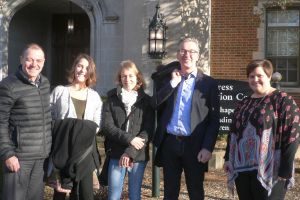
In bright sunshine on the road: Michael Readinger with Susanna Thiel, Martina Althoff, Matthias Dargel and Danielle Bartz (from left)
The focus this time was lobbying, because the American Diakonie receives little money from the government for its social work. In addition, since the presidency of Donald Trump, the state has increasingly withdrawn from funding social programs. Most of the social work done by CHHSM organizations must be funded through donations and contributions from their members. Last year, that was $864 million, nearly 18 percent less than in previous years.
CHHSM: Social help for millions of people
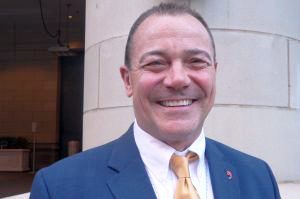
Friendly and cheerful host: CHHSM President Michael Readinger
The association has 68 members with around 400 facilities offering social assistance to millions of people in the United States. They range from health care, care for the elderly, child and youth care to facilities for people with disabilities. CHHSM organizations reached around five million people in the US last year with their outpatient health care service.
Inpatient and outpatient care in Chicago
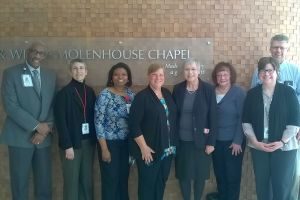
Elke Grothe-Kühn (center) with staff from the Advocate Health Care Hospital in Chicago
The medical station where Mary Ishmen works is one of them. In Chicago, Elke Grothe-Kühn experienced another form of outpatient health care offered by CHHSM member Advocate Health Care. Its Chicago hospital has the city’s largest central emergency room, with approximately 100,000 patients annually. American legislation guarantees everyone the right to receive medical treatment, regardless of individual solvency. Uninsured Americans have to pay for their medical care in case of illness. The treatment in an emergency room can quickly cost $ 700. Many Americans are in debt for their medical care.
Health stations for the poor
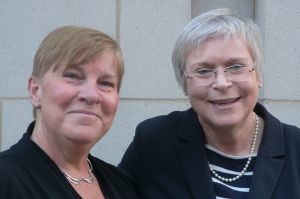
Different languages, but one mission: Elke Grothe-Kühn and Bonnie Condon (from right)
Therefore, Advocate Health Care has set up health stations in the supermarket chain Walgreens. Nurses work here to vaccinate at low cost, care for small wounds and prescribe medication. There are significantly fewer doctors in the US, so many people either go to the clinic outpatient clinics or have to travel long distances to see a doctor. “As a Christian-influenced hospital, it’s important to reach out to people in poorer neighborhoods,” said Bonnie Condon. She is a member of the board of directors of 18 clinics that are members of CHHSM.
Retirement homes on trend
One focus of social work offered by US Diakonia is aid to older people. Last year, affiliates maintained some 20,000 residential units for senior citizens. Unlike in Germany, more and more Americans move to retirement homes when they retire. There they live independently for as long as possible. Those who need more support and care switch to appropriately equipped rooms or apartments.
Noble senior residence with Christian mission statement
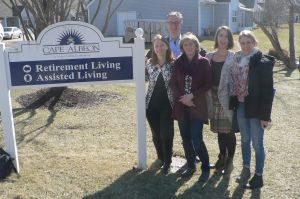
“Cape Albeon” Managing Director Carol DiSanza with Matthias Dargel, Sabine Damaschke, Susanne Thiel and Martina Althoff (from left)
Cape Albeon specializes in this differentiated form of care. The organization accompanies 242 residents in 169 apartments. However, this offer is only available to seniors who have an average to good pension. About 20 percent of the inhabitants belong to a UCC church. “Our institution is under a Christian mission statement and therefore offers many devotions, worship services and Bible lessons,” said CEO Carol DiSanza.
Self-determined life for people with disabilities

“Emmaus Homes” provides people with disabilities in small, barrier-free houses
In handicapped aid, the trend at the CHHSM institutions, on the other hand, is moving away from central housing to small housing groups in which people with disabilities can live as self-determined as possible. Emmaus Homes, founded 125 years ago, is one of the oldest disability relief organizations at CHHSM. It supplies 300 people in the St. Louis area. Over half live in 80 homes in St. Louis, St. Charles, Warren and Franklin Counties.
Heather is allowed to co-decide
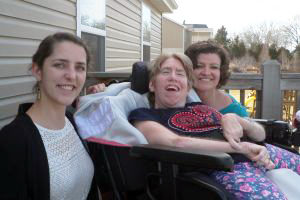
Heather (with Susanna Thiel and “Emmaus Homes” manager Cindy Clark) may decide who lives in their shared apartment
There, Heather lives with her friend in a house where two more places are available. She is allowed to decide who will move in. Eight specialists look after Heather and her friend around the clock. “We are finding it increasingly difficult to find and keep caregivers,” said MD Cindy Clark. The job is hard and not well paid. About 45 percent of the staff changes often. Training and education therefore play a major role at Emmaus.
Nurses for the “church clinic”
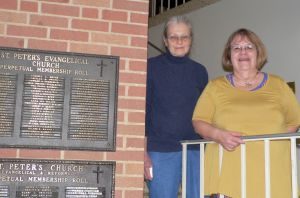
Donna Smith-Pupillo, director of the “Deaconess Nurse Ministry” with nurse Virginia Springmeier, who works in the clinic of the St. Peter’s UCC church
Donna Smith-Pupillo, director of the Deaconess Nurse Ministry, also complained of a lack of junior staff in nursing. For their CHHSM organization, 18 nurses work at 30 locations in the St. Louis area. Mary Ishmen, for example, who looks after the health center in Jennings Affordable Housing, is actually retired at the age of 68. But she keeps working. Virginia Springmeier, who works in the “Salman Free Clinic” of the UCC St. Peter’s Church, is also retired. The church, which has only 160 members but many large rooms, houses an ambulance where a team of 18 Muslim doctors volunteers to treat patients from the region.
A nurse in the “Kindercottage”
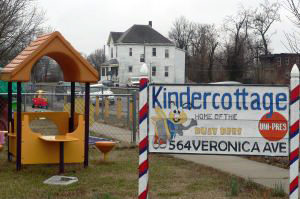
The “Kindercottage” takes care of children from poor families
Her colleague June Brendick is also improving her pension by providing medical care to around 100 children between the ages of six weeks and 12 years at the Uni-Pres Kindercottage Day Care Center. The children from low-income families are cared for here before and after school, so that their parents can work.
Poor maternity protection, no parental and child benefits
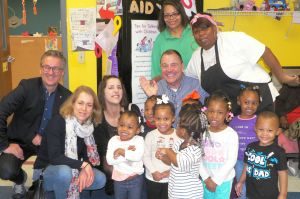
Warm welcome for the German delegation in the “Kindercottage”
In the western world, the US is one of the countries with the highest child poverty. Every fourth child is considered poor. The legal maternity protection is only valid until six weeks after the birth of a child. Parental or child benefits do not exist. In St. Louis, especially African-American children are poor. In the United States, two-thirds of blacks live in low-income neighborhoods, most of which have poorer schools and less income. People with dark skin are almost twice as likely to be unemployed as whites.
Education and care for children from poor families
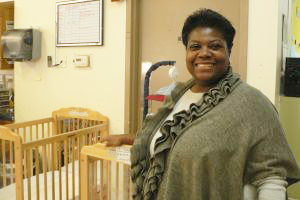
Denise Carter takes care of the preschool children in “Unleashing Potential”
The organization Unleashing Potential takes care of these children. In total, almost 50,000 children were hospitalized and treated as outpatients in the CHHSM facilities in 2017. Unleashing Potential travels to 18 schools in the St. Louis area for around 5,500 children and their family members. Founded in 1914 as a neighborhood project, the association offers care and education services before and after school, trains parents in courses and organizes summer camps during the two-month school holidays. Their work is funded by state programs, low parental contributions and a donation of 20 percent.
From the orphanage to child and youth welfare
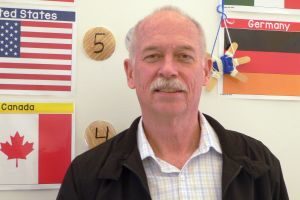
“Every Child’s Hope” CEO Duane Lewis in front of the international flags of the school that the organization has in St. Louis
One of the oldest CHHSM facilities for child and youth welfare is Every Child’s Hope, founded as an orphanage in 1858 by German pastor LE Nollau. On the grounds of the organization, which operates throughout the state of Missouri, live about 100 children and young people in residential groups. Most of them live there for 15 to 19 months. Then they go back to their families or are looked after by foster families. “We attach great importance to the fact that the children only live with us for a while,” explained Managing Director Duane Lewis.
In-house school
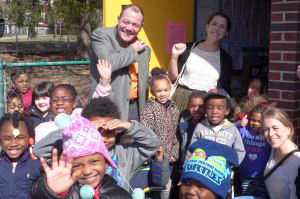
Saying goodbye to the German delegation
Therefore, day care programs and family support, in which the majority of the approximately 200 employees work, play a major role. The school of Every Child’s Hope is also visited by children from the neighborhood. The organization receives a large part of its donations — like many other CHHSM members — from the parishes of the United Church of Christ (UCC). The Protestant church has a total of 1.4 million members, but donate millions of dollars annually to social institutions.
UCC churches donate a lot
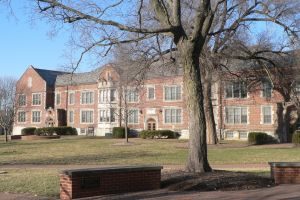
Renowned Apprenticeship: The Theological Seminary Eden of the UCC Church
“The connection between the church congregations and the social work done under the umbrella of CHHSM is narrow,” said director of Eden Theological Seminary, St. Louis, David Greenhaw. It is one of a total of five seminars in which the UCC trains its pastors. But in the sixties, the UCC still had about 2.5 million members. Every year, as David Greenhaw said in an interview with the Diakonie RWL delegation, the churches lose one percent of their membership. The majority of Americans still belong to a church, but for more and more people, religion does not play a big role anymore.
Inspire theological offspring for CHHSM
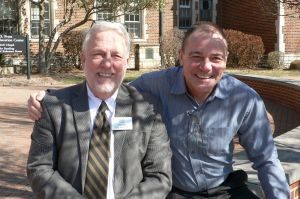
Together strong for diaconal work: David Greenhaw, director of Eden Theological Seminary, with CHHSM President Michael Readinger
“Because our parishes shrank, we need fewer pastors,” the theologian explained. “For social work, on the other hand, we need more people.” The seminar therefore wants to train its theological new generation more strongly for the work in the CHHSM organizations. A concept that CHHSM President Michael Readinger welcomes. “We are the heart of the communities,” he said confidently. “We support the people on a large and small scale, so that their lives change positively.
Join Our Mailing LIst
"*" indicates required fields
Follow on Facebook
Jason Shott Named COO of Phoebe Ministries - CHHSM
www.chhsm.org
Phoebe Ministries, based in Allentown, Pa., has announced that Jason Shott is their new chief operating officer (COO). Shott recently relocated to Pennsylvania from New York, where he was regional vic...